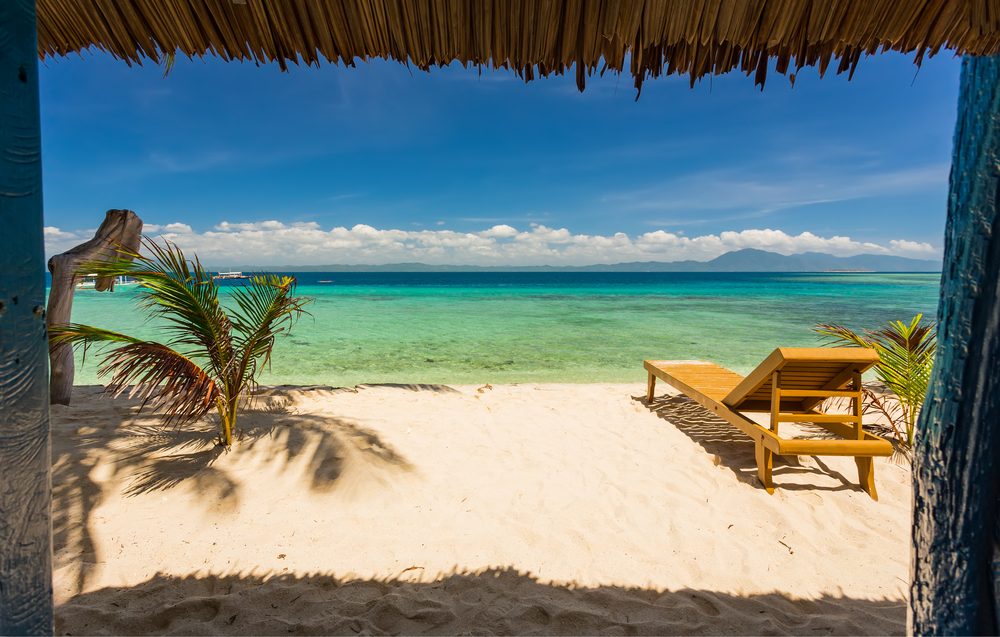
Representative Image, Window view from beautiful beach resort with palm trees and clear water near El Nido, Palawan, Philippines
The tourism industry has cemented its vital role as a pillar of growth and economic recovery post-pandemic as it recorded 6.21 million employment for Filipinos in 2023, an exponential increase nearing its 6.3 million target employment in tourism for 2028 or almost four years ahead, as cited on the approved National Tourism Development Plan (NTDP) 2023-2028.
This was based on the recent Philippine Tourism Satellite Account (PTSA) of the Philippine Statistics Authority (PSA) released on Tuesday (June 18).
Specifically, employment in tourism characteristic industries grew by 6.4 percent, from 5.84 million in 2022 to 6.21 million in 2023. The percentage share of employment in tourism industries to the total employment in the country last year was also recorded at 12.9 percent.
Similarly, tourism as an industry posted its highest growth based on the report with an 8.6 percent share of the country’s gross domestic product (GDP). The Tourism Direct Gross Value Added (TDGVA) amounted to P2.09 trillion in 2023, the highest since the PSA began compiling the data in 2000. The figures are higher by 47.9 percent compared with the P1.41 trillion TDGVA in 2022 when it recorded a 6.4 percent contribution to the GDP.
The TDGVA refers to the gross value added by tourism industries and other industries of the economy that directly serve visitors.
“The tourism growth rate being the highest ever recorded for the Philippines is a testament to President Ferdinand R. Marcos Jr,’s strong emphasis on prioritizing the tourism sector, and with the consolidated efforts of the Department of Tourism, other government agencies and the private sector, our transformative agenda for tourism has set the industry on this upward trajectory whose benefits are felt by millions of Filipinos,” said Tourism Secretary Christina Garcia Frasco.
“Having adopted the National Tourism Development Plan 2023-2028 that strengthens the foundation for tourism on infrastructure and connectivity, and expands government intervention in terms of the development of products, markets, and destinations, it is heartening to see that our efforts to equalize tourism development, engage in shared tourism governance, and diversify our tourism offerings have created more job opportunities and contributed greatly to our economy. We remain committed to further developing and promoting the Philippines to become a tourism powerhouse in Asia as envisioned by our President,” the tourism chief added.
Meanwhile, based on the PTSA report, domestic tourism expenditure also grew by 72.3 percent, from P1.55 trillion in 2022 to P2.67 trillion in 2023.
Among forms of tourism expenditures, inbound tourism expenditure, which refers to the expenditure of non-resident visitors within the Philippines, such as foreign visitors and Filipinos permanently residing abroad, posted a whopping P697.46 billion in 2023, the highest to date registering an 87.7 percent growth from 371.58 billion recorded in 2022, also higher than the P600.01 billion in 2019.
Meanwhile, outbound tourism expenditure posted a 10 percent growth rate, from P189.29 billion in 2022 to P208.25 billion in 2023. Internal tourism expenditure, comprising inbound and domestic tourism expenditure grew by 75.3 percent, from P1.92 trillion in 2022 to P3.36 trillion in 2023.
“The results of the PSA report clearly show the enthusiasm of our fellow Filipinos in exploring and experiencing the beauty of our own country, and their profound love for the Philippines. It reflects the strong desire to support local businesses, contribute to the growth of our economy, and demonstrate the increasing appeal of the Philippines as a destination of choice for both international visitors and our fellow Filipinos abroad. It showcases the richness of our cultural heritage, the breathtaking natural wonders, and the warm hospitality that our country has to offer,” said the tourism chief.
The tourism chief noted that the new initiatives as well as the continuing yet innovative approaches done by the DOT more than two years since the new administration took office were effective not only in terms of enticing tourists by promotion, but more importantly, making the overall tourism experience worthy of an investment.
These include the flagship projects that were introduced to the public for the first time such as the establishment of the Tourist Rest Area (TRA) across strategic locations, the launch of the Philippine Experience Program (PEP) primarily to highlight emerging destinations and offerings, and the opening of the Tourist Assistance Call Center to accommodate all travel-related concerns, and the Tourism Champions Challenge to foster countrywide development of sustainable and resilient tourism infrastructure, among others.
It was also under Secretary Frasco’s helm that the DOT became very proactive in terms of equalizing tourism offerings from gastronomy, dive, film, golf, history, culture, and heritage to medical, as well as the English as a Second Language (ESL) program.|
The collaboration with the public and private sectors, especially the local government units, was also given priority to make tourism in the Philippines more inclusive.
Emphasizing that the positive numbers were a combined work of industry leaders and its workers, the tourism chief said: “We would like to express our gratitude to all stakeholders, including the tourism industry players, national government agencies, local governments, and our dedicated tourism workforce, for their invaluable contributions to this phenomenal performance of Philippine tourism. Together, we will continue to work towards a vibrant and sustainable tourism sector that benefits both our economy and our people. We will continue to focus on implementing strategic and innovative initiatives to enhance tourism infrastructure, improve visitor experiences, expand tourism development, and create more employment opportunities. By harnessing the full potential of our tourism industry, we can continue to contribute greatly to the overall development of the country and the prosperity of our fellow Filipinos.”
“We encourage everyone to support and promote tourism in our country. Let us showcase the rich cultural heritage, natural wonders, and warm hospitality that make the Philippines a destination to love,” enthused Frasco.